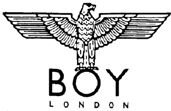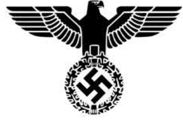THE STREETWEAR TRADEMARK „BOY LONDON“ DECLARED INVALID BECAUSE IT IS CONTRARY TO THE ACCEPTED PRINCIPLES OF MORALITY.
04/03/2020
With its recent Decision No 20 461 C, the Invalidity Division of EUIPO declared the trademark “BOY LONDON” invalid on the grounds that it evokes Nazi symbolism and is, therefore, contrary to the accepted principles of morality according to Article 7(1)(f) RMUE.
The Fact
The Invalidity Division of the EUIPO, by decision of 20 December 2019, declared the clothing trademark BOY LONDON invalid as contrary to morality pursuant to Article 7(1)(f) RMUE.
The figurative trademark in dispute contained a figurative component representing an eagle with wings outstretched with its look to the right resting its claws on the letter “O” of the word “BOY”, written in capital letters under the image of the eagle. Below the word “Boy”, the word “London” appears in significantly smaller characters:

The applicant’s arguments were based on the assumption that the contested sign was a clear representation of the so-called “Parteiadler”, one of the emblems of the German National Socialist Party:

The contrast to accepted principles of morality and public order as grounds for the invalidity of trademarks
As is well known, Article 7(1)(f) RMUE prohibits the registration of trademarks contrary to public policy and morality. The wording of this principle is very broad and requires prudent application taking into consideration, on the one hand, the right of traders to freely use signs they wish to register as trademarks and on the other hand the right of the public not to be disturbed by offensive, threatening or abusive marks. The purpose of the prohibition of registration of trademarks contrary to morality and public policy is not to avoid the commercial use of the sign but to avoid registration of the trademark in cases where the grant of the monopoly that offends against certain basic values of civilised society. Furthermore, it seems necessary to specify that Article 7(2) states that Article 7(1)(f) applies even if the grounds for refusal exist only in part of the Community. The assessment of the existence of an impediment to registration on grounds of contrary to public policy or morality cannot, in any case, be based either on the perception of the part of the public that is easily impressionable or offensive, or on the perception of the part of the public that is imperturbable, but must be made based on criteria of a reasonable person (see 14/11/2013, Ficken Liquors, T-54/13, EU:T:2013:593). For the purposes of examining the restrictions to registration for reasons contrary to public morality or public order, the Invalidity Division – also in the decision in comment – recalls that the relevant public cannot be limited to the target audience of the goods and services for which registration is requested, but, on the other hand, it is necessary to take into account that the sign contrary to public morality or public order could offend those who might accidentally be confronted in their daily lives.
The decision of the Invalidity Division of Euipo
The Invalidity Division, upholding the applicant’s argument, declared the trademark in subject contrary to morality, since the „message evoked by the sign and perceived by the public recalls Nazi symbolism“ and therefore invalid within the meaning of Article 7(1)(f) RMUE in combination with Article 59(1)(a).
First, from a visual point of view, the Invalidity Division considered that the relevant public could perceive the contested trademark as a reference to Nazi symbolism, even though the trademark, unlike the Parteiadler, does not show the swastika and bears the word element BOY LONDON. The omission of the swastika and the addition of the word component, however, do not change the public’s perception of the trademark, according to the assessment of the Invalidity Division, which refers to Advocate General Bobek’s Opinion in Case 240/18P. In that opinion, the Advocate General had found that “morality refers to values and beliefs to which a particular company adheres at a given time (…). Unlike the descending nature of public policy, morality develops from the top-down”. For this reason, in order to assess whether a sign is contrary to morality, it is necessary to use evidence relating to the specific case to ascertain how the relevant public would react if the sign was used to distinguishing goods or services.
In the present case, in support of its argument, the applicant filed, inter alia, several articles of newspapers, magazines and online forums in which both consumers and the mass media compared the contested mark to Nazi symbolism. That documentation showed that, although not all users agree that the contested mark refers to Nazi symbolism, “a non-marginal part of the public perceives the eagle contained in the sign as a reference to the Nazi emblem” (see p. 16 Invalidity Decision No 20 461 C).
In view of all this, the Invalidity Division has therefore declared the contested trademark invalid, establishing that it refers to the Nazi party and communicates an image that is perceived by the relevant public as a reference to an ideology contrary to the fundamental values of the European Union. In particular, “the contested MUE is therefore of such a nature as to shock or offend, not only the victims of the massacres carried out by the Nazi party but also anyone in the territory of the Union who is confronted with that mark and has a normal degree of sensitivity and tolerance”.
Paolo Passadori
